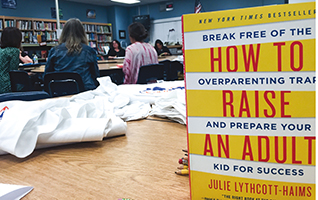
Shared Readings Engage Stakeholders, Superintendents Say
BY JOETTA SACK-MIN/
School Administrator, June 2017

|
| A book discussion open to the public and hosted by Ann Bonitatibus, superintendent of California's Conjejo Valley schools, in a middle school library. |
A book club hosted by a superintendent can be a novel way to connect with community members on topics relating to students’ learning and child development. Superintendents in California, Kentucky and New York who have organized book clubs say they gained unique perspectives through conversations they might not have had otherwise.
Ann Bonitatibus, superintendent of Conejo Valley Unified School District in Thousand Oaks, Calif., calls her book reading group of the past year “a fantastic way to generate two-way community engagement from a wide array of staff, students, parents and community members.”
Bonitatibus organized her group readings as a back-to-school activity last fall. She hosted three meetings in 2016-17, involving about 60 participants total, as they discussed
How to Raise an Adult by Julie Lythcott-Haims. She chose this title after conducting focus groups to discuss school district goals, where “a consistent theme emerged around students’ emotional and social well-being, particularly in an affluent community with exceedingly high expectations.”
After researching books on that subject, Bonitatibus said she felt Lythcott-Haims’ work would resonate with her community. She shared it with a couple of parent and community leaders who highly endorsed the selection.
In Fayette County, Ky., Superintendent Emmanuel Caulk formed a Superintendent’s Book Club in 2016 and invited students, employees and families to share ideas for improving education in the district. During the first book discussions, they have tackled teacher preparation, the needs of immigrant families, state standards, and college and career preparation. Their most recent title was
Beyond the Bake Sale: The Essential Guide to Family-School Partnerships by Anne Henderson, which Caulk says has helped him understand what families want from the school system.
In spring 2016, six English classes in two Lexington high schools read
The Smartest Kids in the World: And How They Got That Way by Amanda Ripley, which chronicles the education experiences of three American high school students who studied abroad, then met with Caulk to discuss the leading themes. The superintendent also held two discussions of Ripley’s work at a local bookstore that offered discounts on purchasing the book. He has hosted an online forum for each book for those unable to come to a discussion session.
“What I wanted to do is put front and center education at the core of our community’s discourse,” says Caulk, who had organized book groups previously as superintendent in Portland, Maine. “And what’s the best way to engage a community — let’s have a shared experience and figure it out together.”
Lisa Brady, superintendent in Dobbs Ferry, N.Y., holds book groups for parents and community members that meet in mornings and evenings in participants’ homes, chosen by the PTSA. They recently discussed the 2016 best-seller
Originals — How Nonconformists Move the World by Adam Grant.
Hosting a book club, Brady explains, “allows me to get to know parents and others in a way that would not have the same result if I simply had a meeting to discuss things. The book chats allow me to gain a greater understanding of what they think and value in our schools and for their children. By grounding these discussions in a text, we can stay focused and the conversations are connected to common themes.”
Brady also writes a blog, and a recent post reflected on the book club. She wrote: “We have talked about creative destruction, leadership themes, strategic procrastination, birth order and siblings, speaking truth to power and lots of other ideas about how we can create the conditions that we want and value in our schools. Each book chat is rich and unique because of the participants’ perspectives. I find this fascinating and exhilarating.”